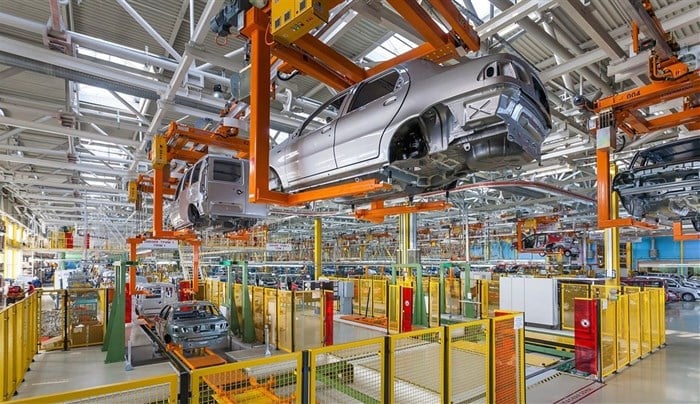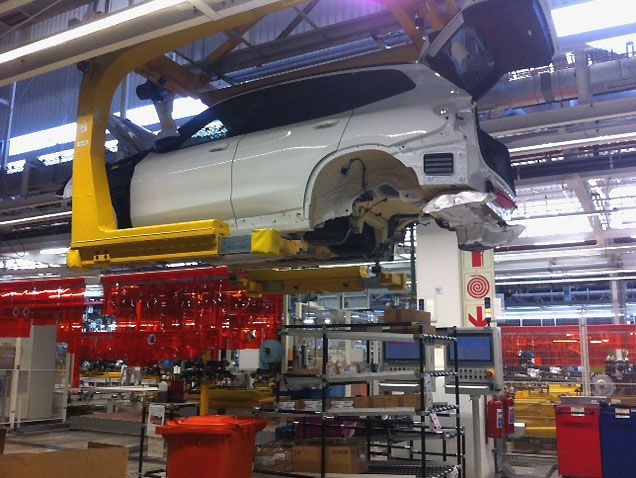The growing demand for ICT in the automotive industry
If there’s one thing that South African businesses have become acutely aware of in recent years, it is the importance of ICT in growing their revenues. Now more than ever, with global giants like China and Japan leading the technology innovation front, it is imperative South African companies are active on many fronts of emerging and disruptive technologies and are supplying the market with relevant products and services.
The future is here!
We are living in an era of advanced technology, where mind-blowing discoveries are emerging and impacting our lives daily. Across the world, technology has played a critical role in improving people’s lives, as inventions and innovations continue to drastically change how people live, what they do and how they do it.

A new dawn is here, as we steer toward the advent of a Fourth Industrial Revolution, an era that builds and extends the impact of digitisation in innovative ways. A world involving entirely new capabilities for people and machines; in which technology becomes embedded within societies and even our human bodies.
The ICT sector is vital to every industry that operates today. From automation to increasing efficiency, unlocking new business ideas and potential, to increasing revenue streams. It is rapidly changing the way every industry works, and the manufacturing industry is no different.
As we forge ahead into this new industrial revolution, internet, computing and scientific advances are making marked waves across manufacturing; transforming the way we produce goods. From advances in artificial intelligence, 3D printing and production materials, to changes in government expenditure and legislation, there’s never been a more exciting time to be in the manufacturing industry.
Transforming the future of the automotive industry
South Africa is home to a substantial automotive manufacturing sector that is increasingly integrated with the global automotive industry, and remains the biggest vehicle market in Africa, accounting for 37% of new vehicle sales on the continent.
The 2018 Automotive Export Manual (AEM), released in May, revealed that 2017 vehicle and component production (with the auto sector being the largest manufacturing sector in the country) accounted for 30.1% of South Africa’s manufacturing output. The yearly export manual, compiled by the National Association of Automobile Manufacturers of South Africa and Automotive Industry Export Council executive manager, Dr Norman Lamprecht, highlighted that the automotive industry “...is and will remain essential to the growth and success of the South African economy.”
Although South Africa produced 56,4% of Africa’s vehicle production in 2017, the industry remains relatively small in a global context and was ranked 22nd in respect of global vehicle manufacturing with a market share of 0,62%. As a country, we compete against major automotive forces such as China, India, Thailand and Mexico, amongst others, for investments and exports.
With this in mind, if the South African automotive sector is to remain competitive, it must sustain rapid innovation cycles and pay attention to emerging and potentially disruptive technologies. New automotive technologies must be implemented, pioneered and deployed.
ICT: the driving force for economic growth
The automotive industry is key to the future of manufacturing in this country. Recently, Trade and Industry Minister, Rob Davies, stressed that development of new infrastructure within the industry, as well as technology and the necessary skills development, were imperative.
“We need to establish a technology and skills road plan that takes account of the Fourth Industrial Revolution. The introduction of digitisation and the disruption that is occurring in production is predicted to have a much more rapid disruptive effect as we move further forward,” he said.
The implementation of ICT in automotive manufacturing is increasingly important in a highly competitive world. Not only does it enable technologies for lowered costs of manufacturing, adding value to core business processes; it also supports the development of systems for future automotive requirements.
Automotive ICT products have become crucial for advancing the automotive industry over the last decade and will become even more important in the next decade and beyond. Today, for example, a luxury car has up to 100 microcomputer-based systems that control nearly all aspects of the car’s operation.

Technology can enable automotive manufacturers to accurately calculate production times, synchronise production, and improve planning and control. This ultimately leads to not only reduced costs but also improved quality.
Recent growth in the Artificial Intelligence (AI) market points to the hundreds of potential use cases for AI in manufacturing, making this area one of the most invested-in by the global venture capital community. Robotics is increasingly being adopted in manufacturing to increase product quality, yield rates, reduce operating costs and improve time-to-customer production performance.
Nurturing an evolving tech labour force
With employer demand for tech talent routinely outstripping supply, there has been a global shift in the education sector, with an inherent focus on enabling workers to acquire better skills and other competencies, particularly “21st-century generic skills” and more technical skills. However, in South Africa, there are not enough people, women in particular, who have the necessary skills to access the tech labour force.
When I founded Belgium Campus in 1999, our initial motivating factor was the need to build a new nation, with talent being sourced from the grassroots levels up; all while bringing higher education, research and industry together to get graduates ready for the real world. Our pioneering programmes and models represent a solution for closing the ever-growing gap between supply and demand as well as promoting higher female participation in tech careers.
The specialisation programmes we offer at Belgium Campus develop our young students into ICT experts, as they continually broaden their horizons by participating in the various innovations being pioneered by our staff and students in collaboration with local government and education partners around the world. All activities undertaken in our speciality hub, the Botlhale Village, are intended to improve the lives of community members in this region.
We believe in social development as a premise to ensure that our society grows and that opportunities are created for everyone in our communities. It is here in this hub, that ICT is applied in innovative ways to provide benefits in areas where they impact on the community and bring about a transformation in their daily lives. This is the essential tenet for change in our country and around the world.
The ICT sector is at the forefront of creating solutions, products and services that have never existed before. This is what makes the ICT sector so alluring and fascinating. One’s limitations are only as wide as one’s imagination. We understand the revolutionary power of ICT and spearhead many innovations with educational and corporate partners, students and government. By empowering our students to innovate and revolutionise their worlds, we have seen brilliant and astonishing solutions flow through our campus. Innovations range through a multitude of industries, illustrating how ICT is leading the charge in making tomorrow something completely different from today.
The way forward
The latest Global Manufacturing Competitiveness Index (GMCI) study found that nations who invest in exponential manufacturing technologies and innovation ecosystems will emerge more competitive than those who choose to compete on price alone. Higher value, advanced products, and processes that require excellent product quality and deliver greater margins are driving faster, permanent innovation.

With this in mind, South Africa’s desire to become an automotive investment destination of choice will be contingent on its drive toward modernisation and implementation of ICT and new tech innovation. One important consideration is the trend towards emerging green technologies. Demand has shifted towards smaller and more fuel-efficient vehicles and, globally, environmental issues have hiked up the political agenda.
The automotive industry in South Africa remains a vital component in the country’s economy and Africa as a whole.
The industry plays both a strategic and catalytic role in economic development and in the coming years, will be filled with new and exciting developments changing the way manufacturers work, improving processes and shifting the employment landscape.
By providing a platform for the development of future technologies, businesses and government alike could lead the charge in making ICT a fundamental enabler for automotive companies to meet current industry challenges, which include changing consumer behaviour, a growing and evolving manufacturing market and the need for improved fuel efficiency.


